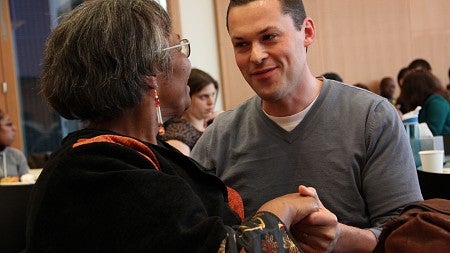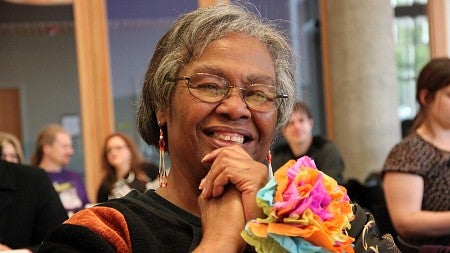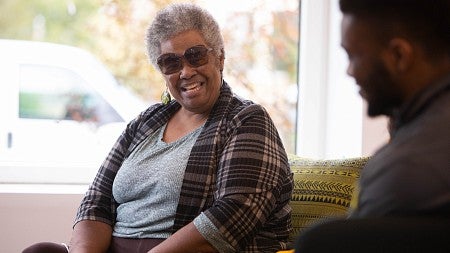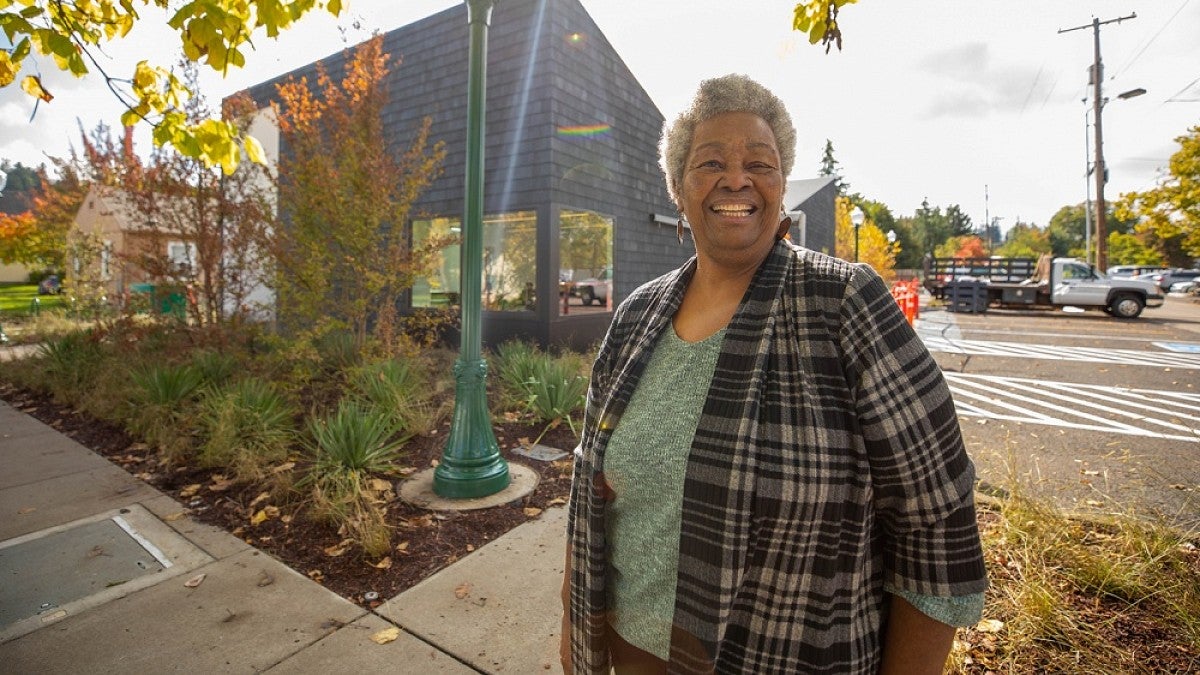Lyllye Reynolds-Parker was done. Ready to retire.
In the late 2000s, after roughly a dozen years of serving as one of the most beloved and respected student advisors on campus, she was exhausted from the effort she put forth every day — and sometimes nights and weekends — supporting and lobbying for her students. But she had been invited to speak to a group of incoming student athletes, and she would deliver on that commitment.
At the conclusion of her talk, she was walking out of the Jacqua Center when a young man called out to her. In tears, he told Parker that she reminded him of his grandmother and asked for a hug.
She obliged and invited the student outside so his friends wouldn’t see him crying.
“We were standing there, and I looked up and every young man that had been in that presentation was lined up to give me a hug and to say thank you,” she said. “And I said, ‘Well, Lord, I guess I’m still here. If that was your sign, it worked.’”
Parker would stay on for a few more years as a result of their gesture, capping a 17-year career in advising.
Lyllye Reynolds-Parker has an incredible ability to make anyone feel welcomed from the moment you meet her, as she did with the student-athletes on that day. This gift connected her with more students than she could possibly estimate; the number of life trajectories she greatly altered for students, their families, their children is innumerable.
For someone born in Eugene in a house without running water, who was discriminated against throughout her life, who went to college as a 40-year-old single mother, it is impossible to overstate the impact she had at the University of Oregon.
It is for all of those hurdles she overcame, and all of the lives she improved, that she received overwhelming support to have the Black Cultural Center named after her. On Oct. 12, the center was formerly opened as the Lyllye Reynolds-Parker Black Cultural Center.
“As all of the Black Student organizations unite together for this naming, we have gained a great amount of respect for the woman who has walked so that we could run. As students of the University of Oregon, the Black Cultural Center is an impactful gain. As Black Students at the University of Oregon, naming the Black Cultural Center after Lyllye Parker is an even greater one.”
—UO Black Student Union in its nomination letter on naming the Black Cultural Center after Parker
Parker almost never worked at the UO.
She was working at Eugene Hospital and Clinic when someone called her about an academic advisor opening and recommended that she apply. Before should could, though, Parker was called away to California for an aunt’s funeral. The application deadline passed, and Parker figured she had missed out.
But she got another call: None of the applicants met the requirements, and they were reposting the job.
“I thought, OK, I’m supposed to do this, Lord. So I put my hat in the ring,” she said.
It wasn’t until she was negotiating pay that she was told the job would be part time, but Parker felt such a pull to work with young people that she took a pay cut to work at the university.
“I was raising two kids, but I thought, ‘OK, God, if this is where I’m supposed to be ...’ . So I accepted the job,” she said.
She fully applied herself in her new position, and the effort didn’t go unnoticed.
“The next thing I knew, the president called my boss and said, ‘I want her full time by 5 o’clock this afternoon,’” she said.
She instantly fell in love with the work and her colleagues. Coming from such humble beginnings, Parker quickly bonded with many students, especially first-generation Ducks.

She is quick to credit her coworkers, many of whom she formed a family-like relationship with as they all strove toward a common goal for their students.
“I had colleagues who supported me as I supported them,” she said. “We would replenish each other’s batteries because there were some hard days. We were the main advocates for our students on a predominantly white campus … . There were some hard days. Not everybody at the University of Oregon was as accepting as they should be.
“Other days were just fun. Students would come by to say hello or bring us treats or just to get a hug. It was always nice to be a part of that office.”
She embraced the students as if they were her own. She was known to take students into her house when they were sick with no family nearby and even took in one student who was battling mental illness until his parents could come get him.
Nurturing students’ critical thinking skills was important to her. When they returned to her once the epiphany hit, that’s when she knew she was doing her job well.
Black students, white students, international students, first-generational students — they all sought her out as her reputation spread as a compassionate, successful advisor.
She remembers best those students who she helped overcome struggles in the classroom. One student discovered he had Asperger’s syndrome and wanted to only work with Parker to overcome it. He graduated the year Parker retired, and spoke at her retirement party.
“He said, ‘I have Asperger’s and Ms. Parker has helped me to graduate from this institution,’” she said. “I cried. I cried. I still carry him in my heart. See, that made it all worth it — and multiply that feeling by hundreds of thousands. It made it all worth it.”
“The UO Black Student Task Force has unanimously agreed that the new Black Cultural Center should be named the Lyllye B. Parker Black Cultural Center. She is a tremendous representative of the UO, African Americans, and humanity as a whole, and we believe it would be a missed opportunity for the UO not to seize this moment to honor her contributions.”
—UO Black Student Task Force in its nomination letter on naming the Black Cultural Center after Parker
Parker grew up in Eugene among a small community of black families who lived off West 11th Avenue, near the street that bears the name of her father: Sam Reynolds.
“In some regards it was the best of times because I lived in my own community,” she said. “And I felt safe in that community. But it was the worst of times because I lived on West 11th in my own community, and we were all poor. We didn’t have running water. We had outhouses. None of the conveniences. We had a two-bedroom house with a loft and my parents had 11 children. You learn how to adapt to your situation.”

Racism, both subtle and overt, was prevalent throughout her time growing up.
“As a child, when I didn’t get a Valentine’s card, when everybody else in the class was invited to the birthday party but not me, all that was painful,” she said. “I just didn’t know why it was happening until the civil rights movement in the South. Fortunately, we had a little black-and-white TV and could see what was going on there.”
When Parker was in eighth grade, she had to write an essay on who she wanted to be when she grew up.
“We were in the civil rights movement,” she said. “I was in love with Thurgood Marshall. He was a powerful man. And I thought, I want to be like him. I want to help people. I want to help my people like he’s doing.”
Her counselor called Parker into her office. Parker’s teacher had sent along her essay.
“She said, ‘You know, Lyllye, you’re not only a negro, you’re a girl,’” Parker said. “’You will never be an attorney. You need to go back and rewrite your essay. Home economics, cosmetology, nursing, those are fields you can probably go into.’ And because she was an administrator, I took her words to the bank.”
She reluctantly went to beauty college, and because of an unspoken code she was unaware of at the time, she couldn’t get a job cutting black hair at a white beauty salon in Eugene. She moved to Portland to work, then returned to Eugene. A marriage and two children later, Parker became a single parent and took a job with the railroad to support her family.
“I am writing this letter in support of naming the Black Cultural Center after an African American Matriarch from this community. I hope to walk past the Black Cultural Center one day and tell my son, this building is named after Aunt Lyllye Parker, a woman that helped many of us in the UO Native American student community.”
—Stephanie Tabibian, UO alumna and Sapsik'ʷałá (Teacher) Education Program Coordinator
Parker was 40 years old when two close friends recommended she go to college, that she was “college material.”
“I’d not heard that before,” she said.
That she was admitted was empowering, she said. She then realized that she’d carried the words of her eighth-grade counselor in her heart for all of those years.
Parker was one step closer to completing a commitment she made to herself when she was 12: She would support young women and young women of color to be whomever they want to be, if given the chance.
Two weeks into one of her first classes, she leaned over to a classmate to ask when the professor was going to start assigning homework. The classmate asked whether Parker had received her syllabus, because all the work was in it.

“I’m glad I finally had sense enough to ask somebody,” Parker said. “One of the first things I tell my students is if you don’t know, ask somebody. But I caught up.”
She was in the same graduating class as her daughter would have been in, and was now a classmate with several of her friends.
“I just so enjoyed being with those young folks because they pushed me,” she said. “They all wanted to study with me because they thought at my age I knew everything. And I let them think that because I wanted to study with them.”
Parker did her schoolwork from 9 p.m. to 3 a.m., seven days a week. She’d get about five hours of sleep, wake up to help her middle-school-aged son off to school, then go to campus.
“It was my purpose then,” she said. “I wanted my kids not to look at musicians and athletes for their heroes. I want them to look at their mother and say ‘I want to be like my mom.’”
College life was difficult in other ways.
Sometimes the racism was painfully overt, such as the time she was in an Oregon Hall elevator.
“A young lady got on and said, ‘Why should I go to a university that people like you attend?’” Parker said. “And I looked at her and said, ‘You know, you really don’t have to. That’s your choice.’ And I got off the elevator and went about my business.”
“Because of her unwavering commitment to helping me get my degree showing me how to become a better person, along with the 17 years of service she has given to University of Oregon students, naming the Black Cultural Center after Mrs. Parker is a small token of thank you that I undoubtedly believe she merits.”
—Andiel Brown, alum and director of UO Gospel Choirs and Ensembles, in his nomination letter for Parker
Even though Parker retired in 2012, she remains in close contact with the university and many of her former students. She’s proud of all of those who passed through her office and went on to earn degrees, especially those who have broken through glass ceilings and are taking her words to heart about “reaching back and pulling somebody through behind you.”
“I look at these young people and I just marvel,” she said. “I just marvel at who they are and take pride in the fact that I was a part of the team that paved the way for them to grow and reach their potential.”
Her impact is lasting in so many other ways. A campus speaker series is named after her. Former students and their parents call to check in on her and chat, sometimes sending along the sweet potato pie filling that she so loves. A former student named her daughter Lyllye after her.
“Mrs. Parker was a constant inspiration to each and every student that sat in her office. You may not always have liked what she was going to say, but you knew that it was delivered with love and the very best of intentions. She let students know she cared, but also that it was their job to do their very best, because no one was going to do it for them.”
—David Spencer, 2016 graduate, Lundquist College of Business, in his nomination letter for Parker
Parker was in shock when Vice President for Student Life R. Kevin Marbury called her and said she had been nominated for the Black Cultural Center naming.
“I said, ‘Kevin, I don’t have a PhD. I’m not a donor. I haven’t written a book, and I’m alive,’” she said. “It’s just overwhelming. Was I pleased? More than pleased. Never dreamed it would happen. Was not even in my imagination. I loved my job, so I did my job. My bonus in doing my job was I met some wonderful students, and I developed some great relationships. And that’s a payday that you just can’t take to the bank.”
That her name received such support made the experience feel genuine in Parker’s eyes.
“It’s just the students saying, ‘Mrs. Parker, thank you!’ And I accept that, and I’m overwhelmed with humbleness and gratitude,” she said.
"Parker has been an inspiration to countless students who sought her support and counsel while at the university. She overcame oppression, achieved her own success, and went on to champion Black student empowerment, community, and justice at the University of Oregon. She embodies our aspirations for what the Black Cultural Center will be for our campus and community."
—Michael H. Schill, university president, in his recommendation letter to the UO Board of Trustees
The eloquent Parker expects to cry when she walks through the center once it’s fully open.
She has great hopes for the building that will bear her name, someone who overcame so much and remains so humble. Someone who went about her work so far and above expectations that it was impossible to overlook her.
“I hope that the center not only is a place for students of color but a place where the university can come together and create community. I’m hoping,” she pauses, “that we see a diversity in that building that’s never been seen before. That people are able to learn and grow.”
—By Jim Murez, University Communications


